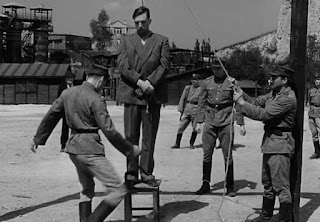This weeks’ “Footprints” discusses the dangers of illness on a wagon train's journey west.
June 5th - At six o'clock again on the move. Roads good yet. Got within twelve miles of the fort (Fort Laramie), stopped and baited our teams and started again. Quite anxious to get there, as Smith and Eaton are no better. Smith will have all the water he can drink all the time, and it is no small quantity that he drinks, which must be very bad, but we cannot make him believe it to be so.
The water has a tendency to give the diarrhea in this section to those that are well. We want to get to the fort to get a doctor for them and to lie by till they get better, which I hope they soon will, when they get a doctor and some rest. Got to the Laramie River, two miles this side of the fort, and encamped for the night. While we were pitching our tents we had a most tremendous hail-storm, the hardest I have seen on the route.
Some of our tents were blown down and I had my fingers well battered up trying to hold up ours, which was on the point of being blown away several times. But we kept it to its place. Tonight Albert Burnhart rode to the fort to get a doctor to come over and see the sick, but he could not succeed, although he offered him a hundred dollars. He got some letters for us, and they were good here in the desert. We are glad to hear from old Ohio and that our families and friends are well.
Sunday, June 6th - This is a day of sorrow and gloom to our little company. This morning we took Mr. Smith and Eaton to the hospital and left them in the surgeon's care, where all will be done for them that could be done at home. They are very sick and look bad - may not live, but hope that they may soon get better. Drove about two miles beyond the fort to find grass and encamped near the Platte River, twelve o'clock, there was one of the men just come from the fort and bring the melancholy news that Smith breathed his last a few minutes before twelve.
His wife has been with him all the time to watch over him In his sickness and she has done all that a wife could do for a husband under the circumstances in which they were placed. Poor woman, how my heart bleeds for her. Truly she is placed in very trying circumstances, and if anyone needed the consolation of religion to sustain them in their affliction it is she, called upon to lose her husband in the wilderness.
But still there is no other place on the route that the same care can be given as here. A man that is placed here in the fort will have all the care that he would in the States, but it came too late for poor Smith. He has gone to that land from which no traveler has yet returned to give an account of the land.
Went down this afternoon to attend the burial of Mr. Smith. The surgeon says the disease is the cholera and that Eaton cannot live. Waited some time for Smith's friends to come and lay him out, but not one came near him. Afraid of the cholera. Myself with the assistance of the ass't surgeon laid him out and placed him in the coffin. I then called his wife and she came and took a last lingering look at all that remained of her dear husband, to bathe his checks with her tears, kiss his cold forehead and bid him farewell until the last trumpet shall sound.
She then thanked us for our kindness and left the room and I nailed the lid down and we carried him to the dead house outside of the fort. The chaplain then came and we followed or rather carried the body to the graveyard where a short service was said and then placed the coffin in the grave and returned to camp and heard that Eaton was dead. This is a day that will long be remembered by us.
Death this day has taken from our number and who the next victim time will determine. This is a loud call to us to be also ready for in such an hour as you think not the Son of Man cometh. Mr. Parmer is unwell and we all feel quite sad and gloomy.
Albert Stevenson was very much scared today and came nigh killing himself by taking medicine. He took so much opium that it thru him into convulsions. He came very near dying. When he began to come to himself when he could talk but did not know what he said he was talking all the time about Lizzy Jane or rather to her, which at any other time would have been laughable and I could not help it sometimes, as it was he took the opium as a preventative and not a cure for he was not sick at all.
Mr. Hoff is getting better. Parkhurst is complaining with a pain in his back and his hips today. He thinks he is going to be sick. I hope not. Fort Laramie is situated on the Laramie River about 3 miles from its mouth where it enters the Platte. The fort is built on three sides of a square of 2 or 3 acres. The buildings are of sun burnt brick and some of them are going to decay and falling down. There are a few buildings the Gov't has a large store of provisions and groceries in and emigrants can buy what they must have if they have money enough.
There is a bakery belonging to the fort and one a short distance from the fort owned by an individual. The easterners or the emigrants that passed by this way which is not a few as the road is lined with them. The cholera is making its appearance among the other trains and more sick left at the fort. This fort like the one that we passed before has no fortifications but resembles a village.
There are several pieces of artillery in the fort or village and soldiers enough to repel any attack from the Indians and there is no one else to molest them. I saw three or four females in the fort, perhaps officer's wives or mistresses. There is a cornfield and a garden of several acres back of the fort. The things look good in them.
Source: Fort Laramie Journals, volume 4
From the diary of Lewis Beers, who left New London, Ohio, March 15, 1852 to go to California during the Gold Rush Days.
Photo: GG-05(733) Yoking Up by W.H. Jackson











Comments
Post a Comment